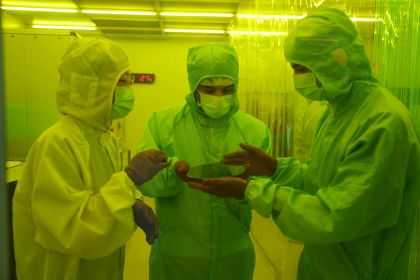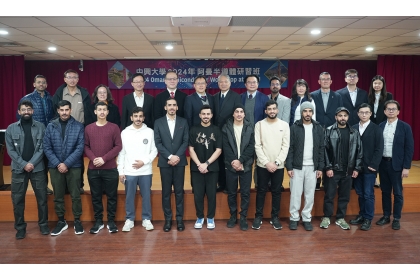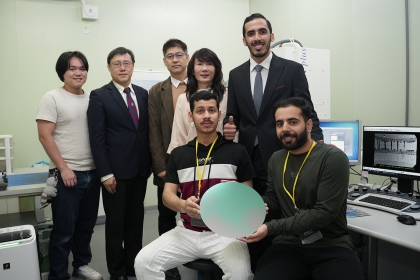Oman Sends Delegates to Taiwan: NCHU Hosts Semiconductor Training Program
2024-12-30
興新聞張貼者
Unit秘書室
2,125
Taiwan's semiconductor industry, recognized worldwide for its cutting-edge expertise in semiconductor manufacturing, has drawn the attention of the Sultanate of Oman. For the first time, Oman selected 11 elite trainees to participate in the "2024 Oman Semiconductor Short-Term Training Program" held from December 16 to 27 at National Chung Hsing University (NCHU). This intensive two-week program offered a comprehensive curriculum that combined in-depth semiconductor theory with practical, hands-on training. Participants gained experience working with advanced equipment and operating within cleanroom environments. Designed to foster high-level research and development talent, the program represents a significant step in advancing Oman’s capabilities in the global semiconductor sector.
National Chung Hsing University (NCHU) boasts a robust and multidisciplinary foundation in the semiconductor field, providing comprehensive courses and research platforms spanning semiconductor materials, device principles, integrated circuit (IC) design, manufacturing technologies, and packaging & testing processes. The university is distinguished by its expertise in advanced inspection techniques and the application of green technologies, with a strong focus on sustainable development and environmentally responsible manufacturing practices. By leveraging interdisciplinary faculty expertise and state-of-the-art equipment, NCHU is dedicated to cultivating highly skilled professionals with both theoretical knowledge and practical proficiency. The university’s commitment to innovation and sustainability positions it as a key contributor of advanced solutions and forward-thinking technical support to the global semiconductor industry.
The program curriculum encompassed essential aspects of the semiconductor industry, including semiconductor materials, circuit design, manufacturing technologies, packaging and testing processes, advanced inspection methods, and green technology applications. To ensure a comprehensive learning experience, the program integrated interdisciplinary hands-on sessions covering coding and circuit design, semiconductor sample preparation, photomask fabrication, lithography processes, thin-film deposition, and precision inspection using field-emission electron microscopes and atomic force microscopes. Guided by NCHU’s expert faculty, these practical sessions enabled participants to immerse themselves in core semiconductor technologies, refine their technical skills, and establish a strong foundation for advancing their careers in semiconductor-related disciplines.
Beyond technical training, NCHU promoted Taiwan’s remarkable achievements in the semiconductor industry. Participants toured the "World of Semiconductors" exhibit at the National Museum of Natural Science, sponsored by TSMC. This cultural and scientific experience offered an in-depth perspective on the historical development and global influence of Taiwan’s semiconductor technology, further enriching their understanding of the industry’s evolution and impact.
NCHU Vice President Chi-Chung Chou highlighted that Oman’s decision to send its top representatives to Taiwan for this international semiconductor training program marks a significant milestone for the Middle East. This initiative aims to establish a systematic framework for developing Oman’s semiconductor talent. The participants, selected from Oman’s leading academic, technological, and military institutions, include internationally educated experts and seasoned industry professionals. Vice President Chou advised the participants to fully leverage this exceptional learning opportunity, expressing optimism that more Omani students would pursue advanced studies in Taiwan. He emphasized that such collaborations could play a pivotal role in positioning Oman as a leader in the Middle East’s semiconductor industry.
Dean of Research & Development Department Jenn-Ming Song of NCHU’s emphasized that the semiconductor industry serves as the foundation of modern technological innovation, driving advancements across sectors such as smartphones, electric vehicles, healthcare, and artificial intelligence. He noted that this program provided participants with both essential theoretical knowledge and practical hands-on experience in semiconductor technologies. These skills, he remarked, will be invaluable as participants pursue future careers as researchers, engineers, or designers, contributing to technological progress in their respective fields.
Director Mon-Shu Ho of NCHU’s i-CAST (i-Center for Advanced Science and Technology) described the program as a landmark achievement in fostering collaboration between Taiwan and Oman in advanced technology and cultural exchange. She emphasized that the initiative represents a pivotal step in strengthening international partnerships, positioning Taiwan as a global leader in semiconductor education and innovation. Director Ho further highlighted the program's significance as a model for domestic universities seeking to establish international semiconductor training schools. Its comprehensive curriculum, combining technical expertise and practical training, sets a benchmark for excellence in global education. She expressed confidence that the program’s success would not only deepen ties between Taiwan and Oman but also inspire similar initiatives across other Middle Eastern nations, fostering a broader network of technological and academic cooperation.
Wail Al Kalbani, a participant from Portland State University, expressed his aspiration to transfer key semiconductor manufacturing techniques to Oman, including optical lithography, laser direct writing for exposure and development, and wafer preparation and processing. He underscored the importance of these advanced skills in supporting Oman’s strategic developmental objectives, highlighting their potential to drive progress in the nation’s emerging semiconductor industry.
Said Al Jabri, a participant from Sultan Qaboos University, highlighted Taiwan’s status as a global leader in the semiconductor industry, emphasizing the program’s invaluable opportunity to engage with cutting-edge equipment and advanced techniques. He also underscored the alignment of the program with Oman’s Vision 2040, which positions semiconductors as a cornerstone for the nation’s future industrial and technological development.
The "2024 Oman Semiconductor Short-term Training Program" was jointly organized by NCHU’s i-Center for Advanced Science and Technology (i-CAST), the International College of Innovation and Industry Liaison, and the Office of International Affairs, with invaluable support from the Ministry of Foreign Affairs. This collaborative effort reflects NCHU’s commitment to fostering global partnerships in the semiconductor sector and advancing international knowledge exchange. Looking ahead, NCHU is dedicated to expanding such initiatives, aiming to create more opportunities for cross-border collaboration in cutting-edge technologies. Through these programs, NCHU seeks to not only enrich Taiwan's semiconductor industry but also inject new academic insights and research-driven innovations. By continuing to strengthen ties with international academic institutions and industries, NCHU will play a pivotal role in enhancing Taiwan's position as a leader in the global semiconductor Industry.
National Chung Hsing University (NCHU) boasts a robust and multidisciplinary foundation in the semiconductor field, providing comprehensive courses and research platforms spanning semiconductor materials, device principles, integrated circuit (IC) design, manufacturing technologies, and packaging & testing processes. The university is distinguished by its expertise in advanced inspection techniques and the application of green technologies, with a strong focus on sustainable development and environmentally responsible manufacturing practices. By leveraging interdisciplinary faculty expertise and state-of-the-art equipment, NCHU is dedicated to cultivating highly skilled professionals with both theoretical knowledge and practical proficiency. The university’s commitment to innovation and sustainability positions it as a key contributor of advanced solutions and forward-thinking technical support to the global semiconductor industry.
The program curriculum encompassed essential aspects of the semiconductor industry, including semiconductor materials, circuit design, manufacturing technologies, packaging and testing processes, advanced inspection methods, and green technology applications. To ensure a comprehensive learning experience, the program integrated interdisciplinary hands-on sessions covering coding and circuit design, semiconductor sample preparation, photomask fabrication, lithography processes, thin-film deposition, and precision inspection using field-emission electron microscopes and atomic force microscopes. Guided by NCHU’s expert faculty, these practical sessions enabled participants to immerse themselves in core semiconductor technologies, refine their technical skills, and establish a strong foundation for advancing their careers in semiconductor-related disciplines.
Beyond technical training, NCHU promoted Taiwan’s remarkable achievements in the semiconductor industry. Participants toured the "World of Semiconductors" exhibit at the National Museum of Natural Science, sponsored by TSMC. This cultural and scientific experience offered an in-depth perspective on the historical development and global influence of Taiwan’s semiconductor technology, further enriching their understanding of the industry’s evolution and impact.
NCHU Vice President Chi-Chung Chou highlighted that Oman’s decision to send its top representatives to Taiwan for this international semiconductor training program marks a significant milestone for the Middle East. This initiative aims to establish a systematic framework for developing Oman’s semiconductor talent. The participants, selected from Oman’s leading academic, technological, and military institutions, include internationally educated experts and seasoned industry professionals. Vice President Chou advised the participants to fully leverage this exceptional learning opportunity, expressing optimism that more Omani students would pursue advanced studies in Taiwan. He emphasized that such collaborations could play a pivotal role in positioning Oman as a leader in the Middle East’s semiconductor industry.
Dean of Research & Development Department Jenn-Ming Song of NCHU’s emphasized that the semiconductor industry serves as the foundation of modern technological innovation, driving advancements across sectors such as smartphones, electric vehicles, healthcare, and artificial intelligence. He noted that this program provided participants with both essential theoretical knowledge and practical hands-on experience in semiconductor technologies. These skills, he remarked, will be invaluable as participants pursue future careers as researchers, engineers, or designers, contributing to technological progress in their respective fields.
Director Mon-Shu Ho of NCHU’s i-CAST (i-Center for Advanced Science and Technology) described the program as a landmark achievement in fostering collaboration between Taiwan and Oman in advanced technology and cultural exchange. She emphasized that the initiative represents a pivotal step in strengthening international partnerships, positioning Taiwan as a global leader in semiconductor education and innovation. Director Ho further highlighted the program's significance as a model for domestic universities seeking to establish international semiconductor training schools. Its comprehensive curriculum, combining technical expertise and practical training, sets a benchmark for excellence in global education. She expressed confidence that the program’s success would not only deepen ties between Taiwan and Oman but also inspire similar initiatives across other Middle Eastern nations, fostering a broader network of technological and academic cooperation.
Wail Al Kalbani, a participant from Portland State University, expressed his aspiration to transfer key semiconductor manufacturing techniques to Oman, including optical lithography, laser direct writing for exposure and development, and wafer preparation and processing. He underscored the importance of these advanced skills in supporting Oman’s strategic developmental objectives, highlighting their potential to drive progress in the nation’s emerging semiconductor industry.
Said Al Jabri, a participant from Sultan Qaboos University, highlighted Taiwan’s status as a global leader in the semiconductor industry, emphasizing the program’s invaluable opportunity to engage with cutting-edge equipment and advanced techniques. He also underscored the alignment of the program with Oman’s Vision 2040, which positions semiconductors as a cornerstone for the nation’s future industrial and technological development.
The "2024 Oman Semiconductor Short-term Training Program" was jointly organized by NCHU’s i-Center for Advanced Science and Technology (i-CAST), the International College of Innovation and Industry Liaison, and the Office of International Affairs, with invaluable support from the Ministry of Foreign Affairs. This collaborative effort reflects NCHU’s commitment to fostering global partnerships in the semiconductor sector and advancing international knowledge exchange. Looking ahead, NCHU is dedicated to expanding such initiatives, aiming to create more opportunities for cross-border collaboration in cutting-edge technologies. Through these programs, NCHU seeks to not only enrich Taiwan's semiconductor industry but also inject new academic insights and research-driven innovations. By continuing to strengthen ties with international academic institutions and industries, NCHU will play a pivotal role in enhancing Taiwan's position as a leader in the global semiconductor Industry.




